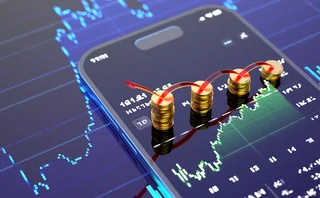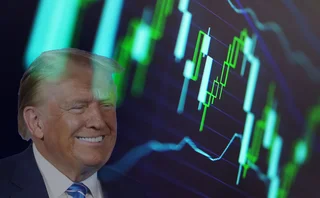
What happens when a bank drops off the systemic risk radar?
Russia’s Sberbank skipped this year’s G-Sib assessment. But just because a bank is invisible doesn’t mean it no longer poses a risk
If a bank falls and nobody’s around to hear it, does global systemic risk rise?
For the first time in 10 years, Russia’s largest lender Sberbank didn’t take part in the latest assessment of global systemically important banks (G-Sibs) or publish relevant indicators for the end of 2021. It’s not clear whether the Basel Committee for Banking Supervision intentionally excluded the bank from the assessment, or whether the bank and its supervisor failed to provide the data – as ostensibly allowed by Kremlin decrees following western sanctions against the country.
Regardless, it deprives regulators, academics, analysts and journalists of the most granular and reliable data publicly available for the bank.
But the risk intrinsic to Sberbank hasn’t simply vanished from the global financial system.
Sberbank had been included in the Basel Committee’s assessment sample, which is made up of the top 75 banks globally by leverage exposures plus other banks at regulators’ discretion. However, it never came close to being designated a systemic lender. In annual tests, its overall G-Sib score averaged 35 basis points, hitting just 30bp in the November 2021 assessment – barely one-quarter of the 130bp minimum that would require designation. That gave it roughly as risky a global profile as Korea’s NongHyup or State Bank of India.
But though no Citi or even Nomura, Sberbank was still deemed large enough by regulators for benchmarking – meaning the systemic risk it posed warranted at the very least monitoring, if not a surcharge to the bank’s Common Equity Tier 1 capital adequacy. Sberbank’s cross-jurisdictional exposures totalled a non-negligible €77 billion ($80 billion) at end-2020, and its trove of over-the-counter derivatives stood at €183 billion.
The West, and especially Europe, has already had a taste of how difficult it is – if not outright impossible – to prevent sanctions fallout from stopping at the border. Albeit a large swath of exposures impacted by sanctions has been written off, unwound or simply offloaded, some banks, most notably UniCredit and Raiffeisen Bank International, are still extricating themselves from positions with Russian counterparties, of which Sberbank is no doubt among the largest. In the US, Citi saw exposures to Russia balloon overnight after deeming the Russian legal system could not be trusted to enforce netting agreements.
More dramatically, in March, even with Sberbank hitherto spared from the worst of the financial sanctions, its Vienna-headquartered central and eastern European franchise collapsed as it was drained of liquid funds. Although the situation was eventually defused, with the franchise being wound down by the Single Resolution Board, there was no telling at the outset how much further into the European financial system the tremors would travel.
In a way, Basel’s G-Sib methodology did compensate for Sberbank’s absence by keeping the sample constant at 76 banks, the same as 2021’s exercise. Specifically, Sberbank, Woori Bank and ABN Amro were replaced by La Banque Postale, Bank of Jiangsu and Bank of Shanghai.
This prevented, to an extent, a sudden fall in the aggregate values that are used as benchmarking denominators. But systemic risk is not a fungible property. Risks intrinsic to Sberbank won’t be captured by benchmarking a similar-sized French or Chinese lender in its place.
Some commentators see Russian banks’ expulsion from global finance as a testbed for how the US and allies may sanction China’s lenders amid a geopolitical rupture – for instance over an invasion of Taiwan. If the same kind of communication breakdown between the Basel Committee and the People’s Bank of China ensued, regulators would have to think very carefully about how they’d keep monitoring the systemic risk of Chinese banks, which accounted for 31% of the latest exercise’s aggregate leverage exposure indicator.
Extricating a major bank from today’s globalised financial system is not like isolating a portion of an electric grid. It is a largely untested, messy and fuzzy disconnection process – one that would thereafter require constant monitoring against unexpected power surges.
Only users who have a paid subscription or are part of a corporate subscription are able to print or copy content.
To access these options, along with all other subscription benefits, please contact info@risk.net or view our subscription options here: http://subscriptions.risk.net/subscribe
You are currently unable to print this content. Please contact info@risk.net to find out more.
You are currently unable to copy this content. Please contact info@risk.net to find out more.
Copyright Infopro Digital Limited. All rights reserved.
As outlined in our terms and conditions, https://www.infopro-digital.com/terms-and-conditions/subscriptions/ (point 2.4), printing is limited to a single copy.
If you would like to purchase additional rights please email info@risk.net
Copyright Infopro Digital Limited. All rights reserved.
You may share this content using our article tools. As outlined in our terms and conditions, https://www.infopro-digital.com/terms-and-conditions/subscriptions/ (clause 2.4), an Authorised User may only make one copy of the materials for their own personal use. You must also comply with the restrictions in clause 2.5.
If you would like to purchase additional rights please email info@risk.net
More on Our take
Fannie, Freddie mortgage buying unlikely to drive rates
Adding $200 billion of MBSs in a $9 trillion market won’t revive old hedging footprint
Degree of Influence 2025: Derivatives pricing dominates; quants don’t follow the AI herd
Rates and volatility modelling, as well as trade execution, top quants’ priorities
There’s a punt factor in stocks that investors might be missing
Speculative trading creates linkages between crypto and equities that vary depending on the stocks in question
Passive investing and Big Tech: an ill-fated match
Tracker funds are choking out active managers, leading to hyped valuations for a dangerously small number of equities
Sticky fears about sticky inflation
Risk.net survey finds investors are not yet ready to declare victory on inflation – with good reason
Why a Trumpian world could be good for trend
Trump’s U-turns have hit returns, but the forces that put him in office could revive the investment strategy
Roll over, SRTs: Regulators fret over capital relief trades
Banks will have to balance the appeal of capital relief against the risk of a market shutdown
Thrown under the Omnibus: will GAR survive EU’s green rollback?
Green finance metric in limbo after suspension sees 90% of top EU banks forgo reporting








